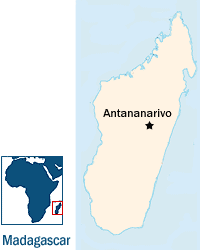
Presbyterians have a long history of partnership with the Church of Jesus Christ in Madagascar (FJKM). The Presbyterian Ministry at the United Nations recently sponsored an event with the Rev. Hubert Rakotoarivony, International Peacemaker from Madagscar and Dan Turk, PC(USA) mission co-worker in Madagascar. They focused on the witness of the FJKM.
The violence and intimidation that the church and the people of Madagascar have suffered over the past two years at the hands of Madagascar’s illegal regime have deeply concerned Presbyterians. Increases in hunger, human trafficking, and environmental exploitation during that period are also matters of concern.
A delegation from the PC(USA) recently visited Madagascar with a focus on solidarity, peace and human rights. The visit was part of the PC(USA)’s respsonse to an overture on Madagascar adopted by the 219th General Assembly (2010) and is the focus of a recent story in the Presbyterian News Service by Judson Taylor.
On Sunday, October 16, more than 30 FJKM personnel shared their stories with a visiting delegation from the PC(USA), led by the Rev. Dr. Clifton Kirkpatrick, Stated Clerk Emeritus of the PC(USA) and former President of the World Communion of Reformed Churches (WCRC). The PC(USA)’s Regional Liaison for Southern Africa, Dr. Douglas Tilton, was also a member of the delegation.
Other personnel had been victims of physical violence. Rev. Valisoa Rafanonerantsoa showed photos of the injuries he suffered when security personnel kicked him repeatedly in his head and all over his body, following his arrest at a prayer service for peace on May 20, 2010. “They said that they would make a sacrifice of me, and they shot next to my ears and my feet. They even stepped on my Bible, and I was not allowed to retrieve it,” he said. Initially, he was denied proper medical treatment. Eventually, he was moved to a medical unit, but he was held for more than three months before being given “temporary liberty”. Rev. Rinà Rasoanaivo told how soldiers shot her husband, Rev. Ranaivo Rivo Arson, as they walked on a public road to the same prayer service. “That night he was operated on, but the next morning at 4:45, he died,” she told the delegation. “Word went around that the pastors present, their wives and children would be arrested, so I sent my four children away to protect them.”
One of the pastors who was forced into hiding was Rev. Tiana Ranaivoniarivo. When the police attacked worshippers on May 20, he and about 60 others sought refuge in a nearby police camp where they knew that a number of officers were sympathetic to the church’s peace efforts. As several of the group tried to slip away from the camp in the early evening, they encountered three government soldiers. “They pulled out their guns as if they were going to shoot us,” Pastor Tiana recalled, “but when they saw me, they said, ‘Oh, Pastor! We will not kill pastors, even though we have been ordered to do so, because we are also FJKM [members].” The soldiers ultimately helped him to escape, but he spent the next several months on the run and did not dare contact his family.
The PC(USA) delegation gave thanks to God for the FJKM’s courageous witness and its commitment to restore democracy through peaceful means. They prayed for the church’s continuing ministry to poor and marginalized people in the midst of great social and political upheaval. Dr. Kirkpatrick told the FJKM personnel that the PC(USA) and the WCRC would join them in calling for the reopening of Radio Fahazavana, the revival of respect for human rights, and the restoration of democracy. The following day, members of the delegation took part in the dedication of a new classroom block at the FJKM church at Ambatotokana. The building had been started by Pastor Ranaivo Rivo Arson a few months before he was shot and killed.
During the delegation’s visit, Dr. Kirkpatrick also brought greetings to a meeting of the church’s National Council and met with officers of the FJKM and with its national Commission on the Life of the Nation to learn more about the church’s perspective on recent developments in this island nation of more than 20 million inhabitants. A key topic of conversation was the flawed “roadmap” for future democratic elections, which emerged from a multi-party negotiating process convened by the Southern African Development Community (SADC). FJKM leaders acknowledged the roadmap as the only realistic route to the restoration of democracy at the moment. However, they expressed grave concerns about its capacity to restrain the Malagasy military from stifling freedom of expression and assembly or to rebuild a culture of respect for human rights.
The PC(USA) delegation raised many of these concerns in a meeting with U.S. Chargé d’Affaires Eric Wong and other members of the U.S. diplomatic corps in Antananarivo. Insights gleaned from their visit also helped to inform a letter from Stated Clerk Rev. Grayde Parsons to U.S. Secretary of State Hilary Clinton. The Stated Clerk’s letter commended the U.S. government for its support for democracy and human rights in Madagascar, but called on Washington to help “unpack” the roadmap’s stated commitment to free and fair elections by articulating detailed human rights benchmarks.
Read the letter from Stated Clerk Rev. Grayde Parsons to U.S. Secretary of State Hilary Clinton →